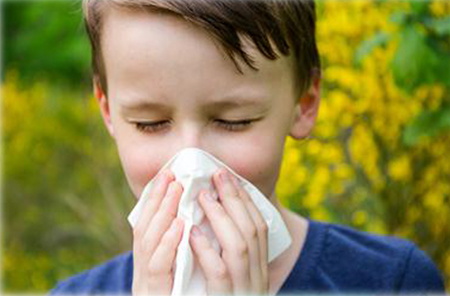Patient information on Allergic Rhinitis
Who is this information for?
This information is for children and adults diagnosed with allergic rhinitis.
What is allergic rhinitis?
Allergic rhinitis is caused by the nose coming into contact small airborne particles called environmental allergen(s) such as grass pollens (when it is known as hayfever), tree pollens, house dust mites, animal hair and moulds.
Who gets Allergic Rhinitis?
Allergic rhinitis affects around 1 in 5 people in Australia.
It can begin at any age though most people first develop symptoms in childhood or young
adulthood. Children < 2 rarely have allergic rhinitis symptoms, and adults rarely develop allergic
rhinitis symptoms for the first time, without having had symptoms as children.
What are the signs and symptoms of allergic rhinitis?
 Nose:
Nose:
- Runny Nose
- Congested Nose
- Itchy Nose
- Post-nasal drip
- Facial pressure or pain
Eyes:
- Itchy Eyes
- Watery, red eyes
- Swelling and blueness of the skin below the eyes
Throat & Ears:
- Sore throat
- Hoarse voice
- Itchy throat
Ears:
- Congesting or popping of the ears
- Itchy ears
Is there a range of symptoms?
- Mild to severe: Symptoms may range from mild to severe. Mild symptoms do not affect day to day function whereas severe symptoms can. Patients may experience periods when they have no symptoms at all.
- Seasonal or All-year: Symptoms may occur in a particular season (usually due to grass, weed or tree pollens) or are persistent and present throughout the year (usually caused by allergies to house dust mites, moulds or animal hairs).
- Age-related changes: Symptoms are often at their worst in children (age > 2) and in people in their 30s or 40s. As we age, symptoms usually gradually become less severe.
- Symptoms from non-allergy stimuli: with continued allergen exposure, people may notice that they also develop allergy symptoms from non-allergic causes such as: cold air, fumes, perfumes, etc.
N.B. Allergic rhinitis is not caused by food allergies.
Can other conditions present as allergic rhinitis?
Symptoms may be similar to those caused by non-allergic rhinitis or an upper respiratory tract infection (eg colds and flu), however allergic symptoms persist unless treated appropriately.
Up to 50% of patients with A. rhinitis also have asthma, and up to 80% of people with asthma may have rhinitis.
Improved control of allergic rhinitis has been shown to give better asthma control in both adults and children.
Are there complications?
Complications may include:
- Sleep disturbance / Poor Quality Sleep
- Daytime tiredness
- Headaches
- Poor concentration
- Asthma which is more difficult to control
How is allergic rhinitis diagnosed?
The diagnosis of allergic rhinitis is based upon the symptoms described above, and physical examination.
Medical tests can confirm the diagnosis and identify the offending allergens.
Such medical tests include:
- Allergy blood tests
- Skin prick testing (see separate handout)
What treatment options are available to manage allergic rhinitis?
Treatment options available to manage allergic rhinitis include:
- Allergen avoidance techniques (see separate allergy-specific patient information sheets)
- Medications (see separate allergy-specific patient information sheets)
- Nasal medications
- Oral medications
- Allergen specific immunotherapy, known as desensitisation, or immunotherapy (see separate allergy-specific patient information sheets)
- Sub-cutaneous Immunotherapy (SCIT)
- Sub-lingual Immunotherapy (SLIT)
The above treatments are usually administered by a combined approach from your GP, your ENT, and your Allergist
Concerns or questions?
You can contact your ENT Specialist at the Melbourne ENT Group (MEG):
- Phone: 1300- 952-808
- Email: admin@melbentgroup.com.au
- Website: www.melbentgroup.com.au
Your GP is also the best contact for ongoing care and concerns.